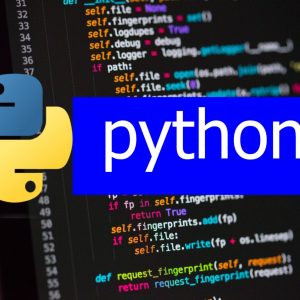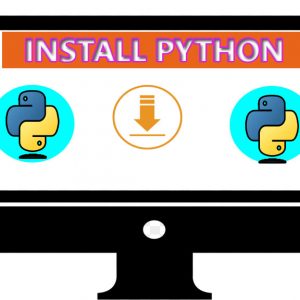
Python has become the language of choice for many developers and data scientists looking to develop Artificial Intelligence (AI) applications. With its easy-to-learn syntax and powerful set of libraries, Python is helping to revolutionize AI development.
Python has been gaining popularity in the world of artificial intelligence for some time now. Its readability, flexibility, and comprehensibility make it a great choice for building AI applications.
In this section, we’ll give a brief overview of what AI is and how Python is being used to revolutionize the field.
What is AI?
Artificial intelligence (AI) is the process of creating intelligent machines that can reason, learn, and act autonomously. This process can be used to create anything from simple chatbots to full-fledged artificial general intelligence (AGI).
AGI, sometimes referred to as strong AI, is an AI system that has human-like general intelligence. This type of AI does not yet exist but is the ultimate goal of many researchers in the field.
You may also have listened ChatGpt which is the popular AI tool used for Chat. It is also made using an AI algorithm.
How is Python being used in AI?
Python is increasingly being used in all stages of developing artificial intelligence applications. From data pre-processing to model training and deployment, Python has libraries and tools that can help with each step. Some popular Python libraries for AI are
- TensorFlow,
- Keras,
- PyTorch,
- scikit-learn.
Read more:
What is Python?
Python is a programming language with many features that make it well-suited for use in artificial intelligence (AI) applications. For example, Python has good support for data structures and algorithms, which are important in AI. In addition, Python is easy to learn and use, which makes it a good choice for AI development.
Python is a versatile language that helps you work more efficiently and effectively. Python is widely used in many scientific areas for data analysis, machine learning, deep learning, and artificial intelligence.
How Python Is Revolutionizing AI
Python has long been a favorite language of programmers for its readability and comprehensibility. But it is also gaining popularity in the field of artificial intelligence (AI). Python is helping to revolutionize AI by providing a simple, yet powerful, programming platform that can be used by developers of all levels of experience.
Python’s syntax is clean and concise, making it easy to learn and follow. Moreover, Python’s extensive library support means that there are already many existing tools and modules that can be used for building AI applications. This saves time and effort for developers who would otherwise need to create everything from scratch.
In addition, Python is open-source and free to use. This makes it an attractive option for developers who want to experiment with AI without incurring high costs. Python’s growing popularity in the AI community is also due to the fact that it can be used for both research and development purposes.
Many well-known companies such as Google, Facebook, Amazon, and Microsoft are using Python for their AI initiatives. They are investing heavily in this language because they believe that Python has the potential to change the way we interact with technology forever.
Use Cases of Python for AI
Python is becoming increasingly popular for implementing artificial intelligence (AI) projects. This is because Python is relatively easy to learn compared to other programming languages, and has a large number of libraries and tools that can be used for AI development.
Some of the most popular use cases of Python for AI include:
- Machine learning: Python is widely used for implementing machine learning algorithms. There are a number of powerful machine-learning libraries available in Python, such as TensorFlow, Keras, and Scikit-learn.
- Natural language processing: Python is also commonly used for natural language processing tasks. There are a number of well-known NLP libraries available in Python, such as NLTK and spaCy.
- Data analysis: Python is often used for data analysis and data visualization. There are a number of popular data science libraries available in Python, such as pandas and matplotlib.
Advantages of Using Python for AI
Python is helping to revolutionize artificial intelligence in a number of ways. Its popularity as a high-level programming language means that it is relatively easy for programmers to get started with AI development. Python also has a number of libraries and frameworks that support AI development, making it an ideal platform for building AI applications.
Some of the advantages of using Python for AI include:
- It is relatively easy to learn and use.
- It has a large and active community of developers who are constantly creating new libraries and tools to support AI development.
- It has a wide range of libraries and frameworks that can be used for developing AI applications.
- It is well suited for prototyping and experimenting with new ideas due to its flexible nature.
- It integrates well with other languages and tools, making it easier to develop complex AI systems.
Challenges Facing the Use of Python for AI
Python is a versatile language that can be used for various purposes, including building AI applications. However, there are some challenges that need to be considered when using Python for AI.
- 1st challenge: Python is not as fast as some other languages when it comes to processing data and running algorithms. This can make it difficult to build large-scale AI applications with Python.
- 2nd challenge: Python is a dynamically typed language, which means that variables can change type during runtime. This can make it difficult to debug Python programs and can lead to unexpected results.
Despite these challenges, Python is still a popular choice for AI development due to its ease of use and extensive libraries. With the right tools and libraries, Python can be used to build powerful AI applications.
Which python framework is best for AI?
Python has long been one of the most popular programming languages and it is now emerging as a leading language for artificial intelligence (AI) and machine learning. A number of Python frameworks have been designed specifically for AI and machine learning, each with its own advantages and disadvantages. So, which Python framework is best for AI?
The answer depends on your specific needs and preferences. If you want to focus on deep learning, then TensorFlow is a good choice. If you need to deploy your models to production quickly, then PyTorch may be a better option. And if you’re just getting started with AI and machine learning, then scikit-learn is a great place to start.
Each of these frameworks has its own strengths and weaknesses, so it’s important to choose the one that’s right for your particular project. But whichever framework you choose, Python will likely be a major part of your AI development process.
Python, java, or C++, which is best for AI?
Python is often cited as the best programming language for Artificial Intelligence and machine learning, and for good reason. It has a large and active community, great tools and libraries, and relatively simple syntax. Python is also versatile – it can be used for web development, game development, scientific computing, and much more.
Java is another popular language for AI development. It has been around longer than Python and is used in many large-scale projects. Java is fast, reliable, and has a huge ecosystem of libraries and tools. However, its syntax can be confusing for beginners.
C++ is another language with a long history. It’s very powerful but can be challenging to learn. C++ is often used for low-level systems programming or game development. However, it can be used for AI development as well.
In conclusion, if you want a good as well as easy programming language then Python is good for you and if you already know Java or C++, you can also use these languages.
How much time do we need to become expert in AI using python
Python has become the most popular programming language for Artificial Intelligence (AI). It is in high demand by major tech companies and is used in many cutting-edge technologies. Python is easy to learn for beginners and has many modules and libraries that allow for robust AI development.
So, how much time does it take to become an expert in AI using Python? The answer depends on your prior experience and commitment to learning. If you are starting from scratch, it will take longer to become an expert than if you already have some experience with programming and machine learning. However, even for experienced programmers, becoming an expert in AI can take years of dedicated study and practice.
In my case, It took me about 1.5 years to create some tools using AI.
If you are committed to learning AI with Python, there are a few things you can do to speed up the process:
- Join or participate in online communities dedicated to AI development with Python. There are many online forums, mailing lists, and Slack channels where experts share their knowledge and help beginners get started. This is a great way to learn from others and get your questions answered quickly.
- Read books and blog posts about AI development with Python. There is a wealth of information available online, and reading about other people’s experiences can be very helpful. Make sure to read blogs from a variety of sources so that you can get different perspectives on different topics.
- Attend conferences and meetups about AI development with Python. Hearing directly from experts in the field is always beneficial, and
How do I start learning AI in Python?
Python is one of the most popular languages for Artificial Intelligence, and it’s no surprise why. Python is easy to learn for beginners and has many libraries and tools that allow for robust AI development. If you’re looking to start learning AI with Python, there are a few things you should do first.
First, you need to make sure you have a good understanding of basic Python programming. If you’re not already familiar with Python, there are plenty of resources available to help you get started, such as the official Python website or Codecademy’s Learn Python course. Once you have a basic understanding of Python programming, you can move on to learning more about AI.
There are many different ways to approach learning AI. You can start by reading articles and tutorials, watching video lectures, or taking an online course. One popular online course is Udacity’s Intro to Artificial Intelligence, which covers topics such as machine learning, natural language processing, and computer vision. Alternatively, you could read books on AI such as “Artificial Intelligence: A Modern Approach” by Stuart Russell and Peter Norvig.
Whichever approach you choose, make sure you have a strong foundation in basic Python programming before moving on to more complex AI concepts. With a little effort and dedication, anyone can start learning AI with Python!
Conclusion
Python is an incredible language that offers the flexibility and power necessary to revolutionize artificial intelligence. With its robust capabilities, Python allows developers to create complex AI algorithms with ease, enabling them to quickly build powerful AI systems that are capable of tackling even the most intricate tasks. As more developers adopt Python for their projects, we can expect to see amazing advances in artificial intelligence over the coming years.
In conclusion, Python has revolutionized the field of artificial intelligence by providing a powerful and versatile platform for developing AI-driven applications. With its clear syntax, a comprehensive library of tools and packages, and a growing community of developers and data scientists, Python offers an accessible way to create sophisticated AI systems that can power everything from self-driving cars to recommendations on streaming services. As more people become aware of the potential applications enabled by Python programming in this space, it is sure to continue making waves in the world of Artificial Intelligence.




